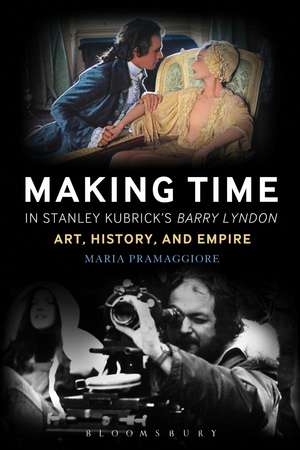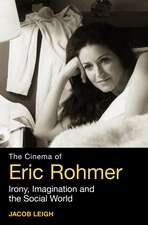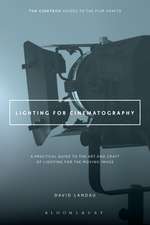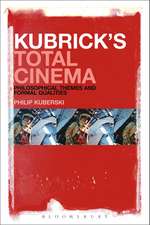Making Time in Stanley Kubrick's Barry Lyndon: Art, History, and Empire
Autor Professor Maria Pramaggioreen Limba Engleză Hardback – 11 feb 2015
| Toate formatele și edițiile | Preț | Express |
|---|---|---|
| Paperback (1) | 191.38 lei 6-8 săpt. | |
| Bloomsbury Publishing – 11 feb 2015 | 191.38 lei 6-8 săpt. | |
| Hardback (1) | 569.22 lei 6-8 săpt. | |
| Bloomsbury Publishing – 11 feb 2015 | 569.22 lei 6-8 săpt. |
Preț: 569.22 lei
Preț vechi: 727.50 lei
-22% Nou
Puncte Express: 854
Preț estimativ în valută:
108.93€ • 118.29$ • 91.50£
108.93€ • 118.29$ • 91.50£
Carte tipărită la comandă
Livrare economică 23 aprilie-07 mai
Preluare comenzi: 021 569.72.76
Specificații
ISBN-13: 9781441167750
ISBN-10: 1441167757
Pagini: 224
Ilustrații: 30 illus
Dimensiuni: 152 x 229 x 20 mm
Greutate: 0.52 kg
Editura: Bloomsbury Publishing
Colecția Bloomsbury Academic
Locul publicării:New York, United States
ISBN-10: 1441167757
Pagini: 224
Ilustrații: 30 illus
Dimensiuni: 152 x 229 x 20 mm
Greutate: 0.52 kg
Editura: Bloomsbury Publishing
Colecția Bloomsbury Academic
Locul publicării:New York, United States
Caracteristici
First book to discuss production studies, postcolonial representation, and transnational cinema practices in one film
Notă biografică
Maria Pramaggiore is Head of Media Studies at the National University of Ireland at Maynooth. She has published four books, two on Irish cinema, and one a co-authored textbook, Film: A Critical Introduction (2011; with Tom Wallis), now in its third edition.
Cuprins
AcknowledgementsIntroductionChapter One: Barry Lyndon and Aesthetic TimeChapter Two: Adapting Barry Lyndon: A Tale of Two AuteursChapter Three: Paternal Crisis, or: History as SuccessionChapter Four: Transnational Topographies: Barry Lyndon as Irish OdysseyChapter Five: The Rhythm and the Rest: Painting, Cinema, StillnessChapter Six: Untimely Cinema: Barry Lyndon and the 1970sBibliography Index
Recenzii
The book brings together a breadth of scholarship and an innovative reading of the film to offer new insights ... [which] will benefit and inspire serious scholars in their research.
Not only a welcome addition to the already bountiful field of Kubrick studies; it is also the sole monograph specifically addressing Barry Lyndon ... The publication is also a demonstration of the value of taking a wide-ranging approach to film research; it explicates in a clear and practical way how different perspectives and methodologies can be integrated to build a provocative and challenging analysis. The great strength of the book is the way the author weaves a web or network of interrelated elements-history, novel, biography, culture, colonialism, identity, gender.
A significant contribution to the Kubrick literature. Impeccably researched and eminently readable, Pramaggiore's book gives Barry Lyndon the full and detailed attention it deserves.
A serious piece of academic study giving in-depth analysis of a film which has rarely been given this level of (well deserved attention). Both intensive and expansive, full of interesting commentary and analysis, this book highlights unconsidered aspects of the film, showing Barry Lyndon to be on a par with Kubrick's other films-a thoughtful, philosophical film, rather than just a series of pretty pictures.
The critical promise that imbues this book-to make time as visible as the shape of the frame or the colors of the tableau-is brilliantly fulfilled in this superb work. A breakthrough in film analysis, and in the study of Stanley Kubrick.
Whilst Pramaggiore is very good at illustrating and discussing the portraits and paintings that might have inspired Kubrick's compositions, she appreciates more importantly what is behind these civilised surfaces, and how Kubrick, like Thackeray in his novel, is delivering a lethal critique of social hierarchy and hypocrisy ... Forty years on, Barry Lyndon, she proposes, 'still has something important to say about image-making, culture and power.' Over the book's succeeding pages, she proceeds to demonstrate that importance with eloquence and authority
Based on research carried out at the Stanley Kubrick Archive at London College of Communication, Making Time is important because it is the only monograph specifically focused upon Barry Lyndon. The publication is also a demonstration of the value of taking a wide-ranging approach to film research; it explicates in a clear and practical way how different perspectives and methodologies can be integrated to build a provocative and challenging analysis. The great strength of the book is the way the author weaves a web or network of interrelated elements-history, novel, biography, culture, colonialism, identity, gender-which together make up Barry Lyndon.
Not only a welcome addition to the already bountiful field of Kubrick studies; it is also the sole monograph specifically addressing Barry Lyndon ... The publication is also a demonstration of the value of taking a wide-ranging approach to film research; it explicates in a clear and practical way how different perspectives and methodologies can be integrated to build a provocative and challenging analysis. The great strength of the book is the way the author weaves a web or network of interrelated elements-history, novel, biography, culture, colonialism, identity, gender.
A significant contribution to the Kubrick literature. Impeccably researched and eminently readable, Pramaggiore's book gives Barry Lyndon the full and detailed attention it deserves.
A serious piece of academic study giving in-depth analysis of a film which has rarely been given this level of (well deserved attention). Both intensive and expansive, full of interesting commentary and analysis, this book highlights unconsidered aspects of the film, showing Barry Lyndon to be on a par with Kubrick's other films-a thoughtful, philosophical film, rather than just a series of pretty pictures.
The critical promise that imbues this book-to make time as visible as the shape of the frame or the colors of the tableau-is brilliantly fulfilled in this superb work. A breakthrough in film analysis, and in the study of Stanley Kubrick.
Whilst Pramaggiore is very good at illustrating and discussing the portraits and paintings that might have inspired Kubrick's compositions, she appreciates more importantly what is behind these civilised surfaces, and how Kubrick, like Thackeray in his novel, is delivering a lethal critique of social hierarchy and hypocrisy ... Forty years on, Barry Lyndon, she proposes, 'still has something important to say about image-making, culture and power.' Over the book's succeeding pages, she proceeds to demonstrate that importance with eloquence and authority
Based on research carried out at the Stanley Kubrick Archive at London College of Communication, Making Time is important because it is the only monograph specifically focused upon Barry Lyndon. The publication is also a demonstration of the value of taking a wide-ranging approach to film research; it explicates in a clear and practical way how different perspectives and methodologies can be integrated to build a provocative and challenging analysis. The great strength of the book is the way the author weaves a web or network of interrelated elements-history, novel, biography, culture, colonialism, identity, gender-which together make up Barry Lyndon.












